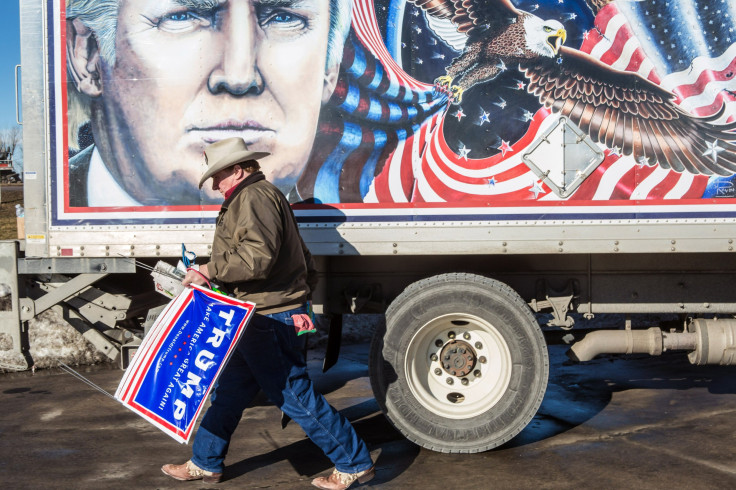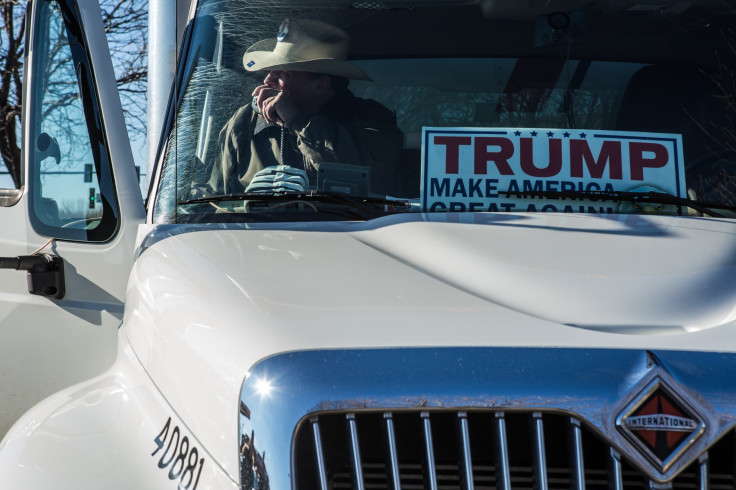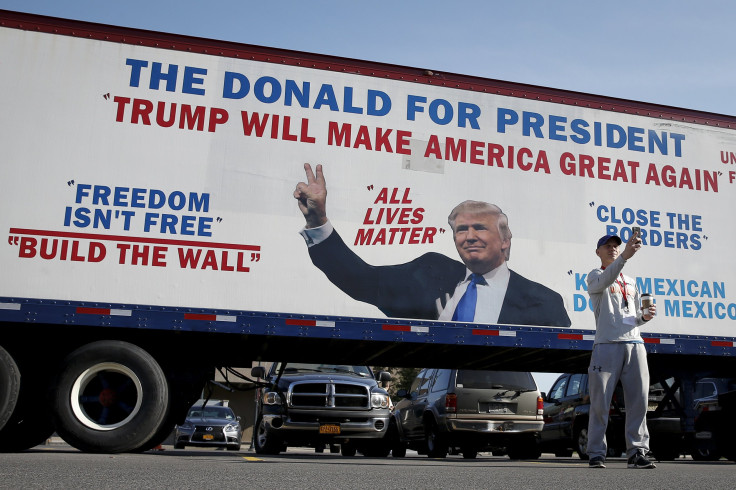Will Donald Trump Save Jobs? Future Of Truck Driving Shows How Hard Governing Might Be

Fourteen hour days sitting in the cab of a truck has given Bryan Peters nearly everything he wanted from life. His trucker's salary helped him raise his now-adult daughter, build his dream home and carve out a few hours on weekends to hit the golf course.
It's a version of the American dream, Peters, a lifelong self-described Republican, has faith President-elect Donald Trump will protect for future generations of truck drivers and other working-class Americans like him.
"He understands the working class man out here, he worked his ass of to get where he is today," Peters, 48, said in a phone interview with International Business Times. "It doesn’t matter if it's a driver, factory worker, whoever, [Trump is] going to put more jobs on the table... I really believe that."
Truck driving, one of the most common working-class job in Trump's economy, brings good pay and doesn't require a college degree. But like many of the blue-collar jobs the president-elect regularly promised to save during his campaign, its future is less than certain. Automation could soon come for trucking jobs, as it did for factory workers, and even a politician as untraditional as Trump might not be able to do much to stop it.
As it stands, there are about 3.4 million total truck drivers in the country and 7.1 million people employed in jobs related to trucking activity, according to a 2015 report from the American Trucking Associations. A widely circulated NPR graphic last year showed that truck driver was the most common job in more than half of U.S. states, in part because of how the Bureau of Labor Statistics sorts common jobs, such as educators, into smaller groups.
The Labor Department pegs the median salary for tractor-trailer drivers at $40,260. Roughly 73 percent of all commercial drivers were white, although ethnic minorities have increasingly entered the trucking field, industry news outlet Transport Topics reported in late 2014. Less than five percent of drivers were women. That means in all, truckers largely resemble Trump's most important bloc of voters, white men who are working class but not among the poorest Americans.
Truck drivers, in turn, largely voted for Trump, according to reports and anecdotal evidence. Trucking magazine Overdrive ran informal polls and consistently found that about 75 percent of its readers supported the billionaire businessman. Industry groups have largely expressed optimisim after his win and trucking-related stocks rose after the election restults.

John Pagotto, 75, has been driving a truck for more than half-a-century and said the chatter on CB radios long suggested truckers were going for Trump like he was. Pagotto, a self-described Democrat, supported the candidate, in part, for his tough talk and promise to put "America first."
"I've sat in the truck stops up and down the East Coast and everywhere you hear, 'Trump is the man, Trump is the man,'" he said.
Pagotto's boss Jim Barrett, 65, runs Road Scholar Transport, a trucking company headquartered in Pennsylvania. Barrett, also a longtime self-described Democrat, switched parties and voted for Trump for a number of reasons, including the fact that the candidate was anti-establishment and promised to do away with Obamacare, which Barrett called "unaffordable to the working world."
Analysts have worried that Trump's tax policy, paired with his anti-globalism trade policies and financial deregulation, could trigger a recession. Trump's planned tax cuts also won't do much for low-income families, but will help the richest Americans. All of this would be very hard on truckers, who are largely a part of the working and middle classes.
Trump did, however, propose massive spending on infrastructure, a favorite pledge among truckers. The Trump transition and campaign teams did not respond this week to requests for comment.
"I do think that we’re going to see a resurrection of infrastructure, our highways and bridges," Barrett said. "The roads in the Northeast are deplorable," he added, jokingly referencing Hillary Clinton's remark during the campaign that half of Trump supporters belong in a "basket of deplorables."
The American Trucking Associations, which boasts more than 37,000 members, said it was pleased with Trump's promised 10-year, $1 trillion infrastructure package. But that infrastructure plan likely faces tough congressional scrutiny and might take years to show any real impact.
"What is critical for our industry is that this not be a one-shot, one-off stimulus, but rather the start of a long-term, sustainable funding plan for our roads and bridges," Sean McNally, the organization's vice president of public affairs and press secretary, wrote in an email to IBT.

Even if Congress spends more on roads, robots, not humans, could soon drive the trucks rumbling down America's highways and main roads. Autonomous cars have already taken to the roads, and projections indicate there could be 10 million on the road by the end of Trump's first term. Fully automated trucks could put 1.7 million truckers out of a job within the decade, the L.A. Times reported this year. Drivers reportedly account for about one-third of the costs in the trucking industry and there isn't much a president can do to stop a private company from making more money.
This isn't just an imagined future: It's already happening. Otto, an autonomous trucking company that was bought by the ride-hailing service Uber, made a delivery of beer this year and has been approved to travel two routes in Ohio.
There's also been "soft-automation," like automatic braking and lane-assist, that has made the job easier but has perhaps caused stagnation in pay because the job can be less skilled, said Noël Perry, an analyst at industry research firm FTR Transportation Intelligence.
"Despite a shortage in high quality drivers, pay hasn’t gone up in five years," Perry said. "Trucks are easier to drive."
He predicted jobs parking trucks in yards will be automated within five years, while driverless trucks could be the norm within the decade.
"The free market produces jobs, the government doesn't," Perry said. "On the manufacturing side, the reason jobs went away was only partially foreign competition. It was mostly automation and the same thing is happening in trucking."
McNally from the American Trucking Associations predicted automation will make the jobs easier, but not eliminate it. He compared it to airline pilots who rely on autopilot for most everything outside of takeoff and landing.
But Barrett, the owner of Road Scholar Transport, was less certain. He thinks there will be pushback against automation, but if it reduces traffic accidents, arguing against it will be hard.
"Technology is going to prevail, there's no doubt," Barrett said. "We live in a very disruptive time, everything is being challenged. The status quo is a very uncomfortable place to be."
For Peters, who has given everything to the rigors of being a trucker, even his marriage, the idea of a robot doing his job is unimaginable.
"I'm divorced because of this industry; I worked my ass off," he said. "Your employer's got you for 14 hours."
The Dunmore, Pennsylvania, native said, "you can never put a robot in the driver's seat."
"I love coming to work every day," he said, his voice mingling with the sounds of his GPS' monotone directions as he used a headset to chat on the phone from his truck. "You don’t need to be a doctor or a lawyer, you can work hard in this country and still receive good things."
© Copyright IBTimes 2024. All rights reserved.












